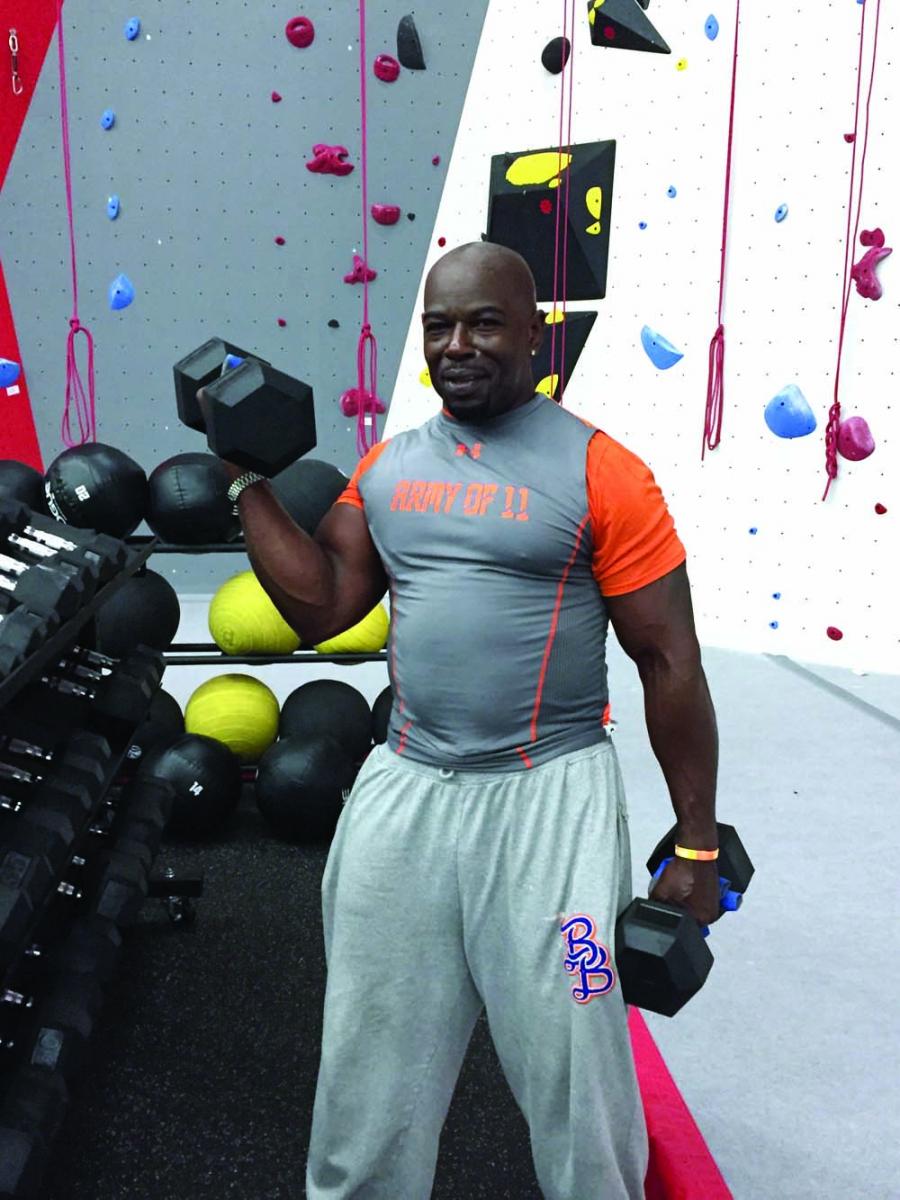September 20, 2018

The Phoenix’s space includes crossfit and weightlifting equipment, a yoga studio, and a panoramic climbing wall as tall as the green monster. Dan Sheehan photo
The entrance to The Phoenix, which looks out on a row of food packing warehouses east of the South Bay Center, is an unremarkable glass door that’s easy to open. But because of what’s behind it, everyone familiar with the site knows it as “The Five Thousand Pound Door.”
“Walking through the door is always the hardest part,” said Michael Underhill, the manager of community partnerships and development at the new Boston location of the organization, a nationwide free sober active community that offers both exercise facilities and a support center to those recovering from a substance use disorder.
Based in Boulder, Colorado, The Phoenix has equipped its space in Newmarket Square with state-of-the-art training equipment, a crossfit/yoga studio, and a panoramic climbing wall as tall as the Green Monster. The amenities are free to any member of the community actively trying to get clean; the only requirement to join is 48 hours of sobriety. But, as Underhill explained, embarking on the journey to recovery is the biggest challenge.
“One of our coaches gave us this quote: ‘It never gets easier, you just get better at it.’ And I think that really defines a lot of what we do here.”
By using physical activity as a tool in the recovery process, The Phoenix aims to eliminate the stigma that accompanies addiction and the struggle to get sober. Members are encouraged to be open and proud about their recovery; many wear t-shirts with the word SOBER printed across the chest. In addition to fitness programming, the organization also offers a comprehensive support system, making its space available for neighborhood 12 step programs and partnering with local organizations like the Gavin Foundation and Hope House to provide other resources to help members throughout their recovery.
“The reason we have free programming is to reduce the barriers that often go up for folks who are coming out of very structured environments, whether it’s incarceration or halfway houses or rehab facilities,” explained Underhill. “When that structure is taken away, a lot more walls go up.”
The idea is to break down those walls using a peer support model that builds togetherness and commonality among trainers and trainees who are working toward the same goal: building what the coaches call “personal recovery capital,” a metric that gauges the attitudes members have toward themselves and their recovery. This sense of community is bolstered by the fact that all coaches, and many staff members, including Underhill, are themselves recovering addicts.
“I discovered the Phoenix when I was about a month sober at the time,” said Underhill. “It was not the first time that I had tried to get sober. It was something that was a source of shame for me, and really a lot of – you know, I focused on my mistakes in my past and really looking back, and I didn’t share it with anybody. I white-knuckled it and I was totally isolated in my recovery. And when I came here to Phoenix, it was the first time that I felt like there was a sense of hope and pride in recovery.”
Before Underhill knew it, he was breaking weightlifting personal records and was six months sober. Now, more than two years after finding The Phoenix, he’s giving back by helping other people navigate their own paths to sobriety.
Another staff leader who has experienced the transformational power of an active community firsthand is Sean Cahill, a veteran climbing instructor from the Boulder branch who came to Boston in April to help launch the climbing program here. He had never rock climbed before joining the organization after getting sober in 2008, but he said that the activity quickly became an important part of his recovery, on both a literal and a symbolic level.
“There’s lots of metaphors in climbing for recovery,” said Cahill. “I mean, you have to learn a lot of trust, because you’re trusting someone holding you. You’re doing things that you were convinced there was no way you could do beforehand, and that’s one of the more powerful things in the beginning. … It’s just an incredibly powerful experience.”
Tattooed on Cahill’s left forearm is The Phoenix motto: “Per ignem ad astra,” a Latin phrase that translates as “through fire to the stars.” Paired with the symbolism of the phoenix itself, a creature that rises anew from its own ashes, the motto serves to inspire members in their struggle to redefine who they are and begin a new life.
“For us, a big thing is also helping people think about themselves differently,” added Cahill. “It’s about re-identifying yourself.”
From his experience as an instructor, Cahill knows that trying something new always comes with a level of risk. But beginner climbers, much like new Phoenix members, always have someone supporting them to fall back on.
“There’s this tendency at the beginning to, like, hold onto things way more tighter and stronger than you have to, and you kind of destroy your grip,” he said. “Climbing’s not about holding on as much as it’s about not letting go.”
The Phoenix has been in Boston for about three years, but it is poised to expand rapidly with its Newmarket facility finally completed. The brand-new space, which will celebrate its official grand opening on Sept. 29, will look to model the success of its sister facilities in cities from Boise to Philadelphia, where surveys show that people who go through The Phoenix have much reduced relapse rates compared to the national average. The Denver facility currently serves around 2,000 individuals a year, a figure that its Boston counterpart will target as a benchmark once it is up and running.
The organization’s free programming for those in recovery and their supporters – family members, friends, and first responders – is made possible through grants and donations, and supplemented by regular crossfit and climbing classes that are open to the public.
“It’s just like joining a regular crossfit gym or climbing gym, and the fees directly support both our workforce development program and our general operating,” explained Underhill. (The Phoenix also offers workforce development training programs for members who want to become certified as crossfit or climbing instructors.) “It’s a great way for folks who are in the community who want to be, you know, both going to a gym and getting their workouts but also having their gym fees go to a good cause.”

Eddie Bailey, 47: “I got clean on June 26th, and I ain’t lookin’ back no more.”
Eddie Bailey was among a handful of people getting in a workout during an afternoon open session at the gym last Friday. The 47-year-old said he found out about The Phoenix through an information session at Hope House. “I’ve only been coming here about two weeks. I ain’t been here that long man, but I been doing this a long time,” he said, referring to his lengthy struggle to stay sober. He added, “I’m like a loner...sometimes I tend to isolate myself, but this time I’m doin’ it different.”
Having recently opened the Five Thousand Pound Door, Bailey is just beginning to tap into the sense of community fostered by Phoenix members. “It’s a beautiful thing they’re doin, you know, all these people in recovery. Man, it’s amazing. Everybody’s been nice to me since I got here. I haven’t done the crossfit stuff yet, but I’m goin to get there...I got clean on June 26th, and I ain’t lookin’ back no more.”
Bailey has made his way through the fire; now, he’s aiming for the stars.



